MARKET ANALYSIS 2020
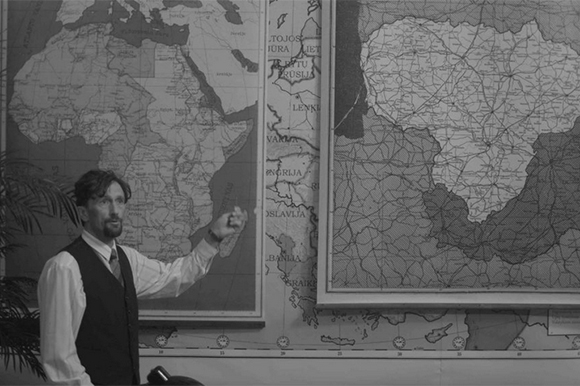 VILNIUS: The Coronavirus pandemic was challenging for the Lithuanian film industry as limitations were imposed upon all culture and film events in the whole country.
VILNIUS: The Coronavirus pandemic was challenging for the Lithuanian film industry as limitations were imposed upon all culture and film events in the whole country.
Still, Lithuanian films of all kinds (feature, documentary, animated and short films) had their world premieres at internationally acclaimed festivals, including Cannes, Karlovy Vary, Leipzig, Venice, San Sebastian, Warsaw, DOC NYC, Tallinn, with the support from the Lithuanian Film Centre.
Total production expenses in Lithuania were 37,911,134 EUR, making 2020 the most profitable year for the tax incentive scheme since its launch. Lithuania saw the infection rate increase over October and November, but film production didn't come to a standstill and international projects arrived from Finland, Norway, Sweden, the UK and France starting August 2020. They include Netfix’s crime drama series Clark, and the Nordic Entertainment Group (NENT) series Max Anger.
It was a successful year for Karolis Kaupinis's debut feature Nova Lituania, which triumphed at the Lithuanian Film Awards Silver Crane with six awards. The film was also chosen as Lithuania‘s entry for an Academy Award nomination in the Best International Feature Film category.
In 2020 the Lithuanian Film Centre appointed a new director, Laimonas Ubavičius.
PRODUCTION
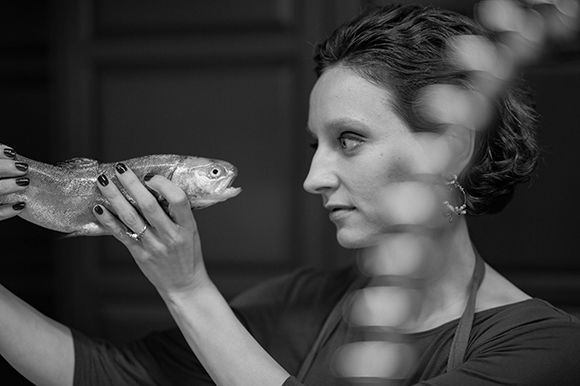 Ernestas Jankauskas shot his new feature film I Am Fine, Thanks / Man viskas gerai, produced by Dansu, in 2020.
Ernestas Jankauskas shot his new feature film I Am Fine, Thanks / Man viskas gerai, produced by Dansu, in 2020.
Fralita Films produced two films simultaneously - A Butterfly‘s Heart / Drugelio širdis directed by Inesa Kurklietyte and Family / Šeima directed by Austėja Urbaitė.
Kristijonas Vildžiūnas finished his fifth feature film Songs For a Fox / Dainos lapei, which was produced by Lithuania's Studio Uljana Kim in coproduction with Latvian Locomotive Productions and Estonian Eesti Joonisfilm.
Andrius Blaževičius shot his sophomore feature Runner / Bėgikė, produced by Lithuania’s M-films.
Ukrainian director Sergei Loznitsa's new film was also in production in 2020. The archive documentary project The Natural History of Destruction / Natūrali naikinimo istorija is produced by Germany‘s LOOKS Filmproduktionen GmbH in coproduction with Lithuania‘s Studio Uljana Kim and Atoms & Void from the Netherlands.
A total of 25 new films of various lengths and genres were finished in 2020, including 11 feature films, 13 documentaries and one animated film.
The list of international productions which used the increased 30% tax incentive scheme in 2020 includes: the 4th season of the Netflix series Stranger Things, created by the Duffer Brothers and serviced by Virtus Mediae; the Nordic Entertainment Group (NENT) series Max Anger - With One Eye Open / Neprarask budrumo, made in coproduction with UK-based Twelve Town, directed by Lisa Farzaneh and Jesper W. Nielsen and serviced by Paprika Filmai; the 2nd season of the Swedish crime drama The Truth Will Come Out / Tiesa vis tiek išaiškės directed by Hans Jörnlind and Aron Levander, produced by Nordic Entertainment Group (NENT Group), coproduced by Discovery Networks Sweden and serviced by Ahil; the sci-fi Skylines / Horizontai directed by Liam O'Donnell and produced by M45 Productions, Hydraulx, Gifflar Films Limited Lipsync Productions, Fasten Films, and serviced by Cobaltas; the Swedish six-part Netflix series Clark directed by Jonas Åkerlund and serviced by Dansu; the war film The Forgotten Battle / Pamirštas mūšis directed by Matthijs van Heijningen Jr., produced by Levitate Film and Caviar Films, and serviced by Artbox, the Finnish comedy Potato / Bulvė directed by Joona Tena, produced by Yellow Film & TV and serviced by Filmai LT; and the French film Kompromat directed by Jérôme Salle, produced by Super 8 Production, SND Groupe M6 and serviced by Virtus Mediae.
In 2020 foreign productions got incentives totalling 8,059,073 EUR.
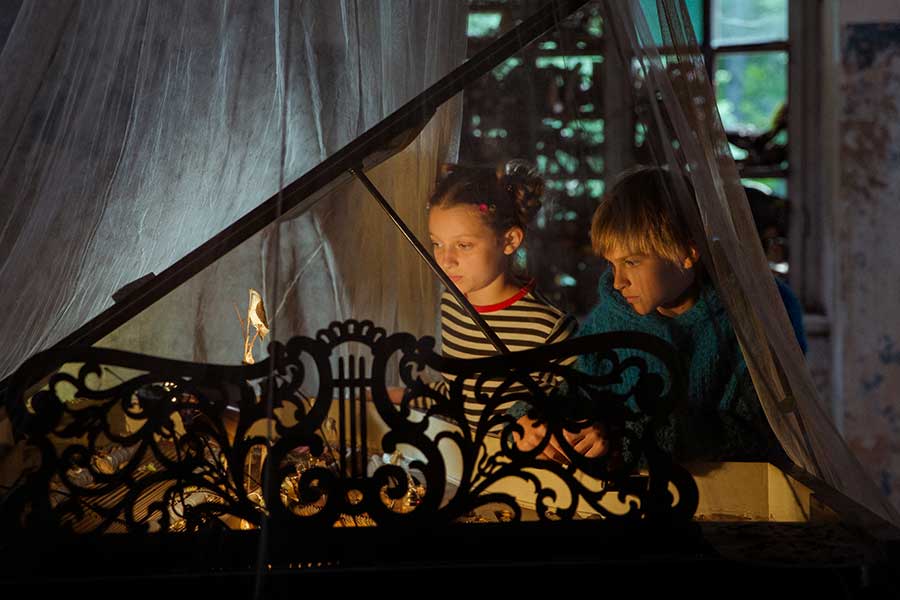 COVID GOVERNMENT SUPPORT
COVID GOVERNMENT SUPPORT
In an attempt to compensate the issues created by the COVID-19 pandemic, the film sector was provided with 6.2 m EUR funding by the Lithuanian Film Centre, which made Lithuania the only Baltic country to receive such a multifaceted support for the film sector.
Additionally, 475,080 EUR went for supporting 28 film projects in production, while 2,717,850 EUR were distributed to 63 new film and TV projects. After an evaluation of film events and festivals set to take place in 2020, further 88,270 EUR were provided to cover the expenses of 21 such events.
Part of the additional funding was dedicated to individual creators for writing and developing new screenplays, preparing publications and research on cinema works. A total of 118,800 EUR were granted to 48 authors.
In an attempt to reduce the losses caused by the COVID-19 pandemic to cinemas and film distributors, one-off grants totalling 2.8 m EUR were also issued. The support reached 18 cinemas, which received 2.24 m EUR, while 12 film distribution companies received 560,000 EUR.
The Lithuanian Film Centre has also initiated the inclusion of film producers and film distributors in the list of companies compiled by the STI (State Tax Inspectorate Under the Ministry of Finance of the Republic of Lithuania). The listed companies are released from interest on arrears and tax recovery, and will be able to pay the taxes at the end of the state of emergency or to create a tax loan agreement.
DISTRIBUTION
A total of 272 films were screened in Lithuanian cinemas in 2020, compared to 383 in 2019.
A total of 13 new Lithuanian films were released in 2020, including Karolis Kaupinis's debut feature Nova Lituania, produced by M-films; Romas Zabarauskas gay romantic drama The Lawyer / Advokatas, produced by Naratyvas, and Lina Lužytė’s The Castle / Pilis, produced by Artbox in coproduction with Irish Samson Films.
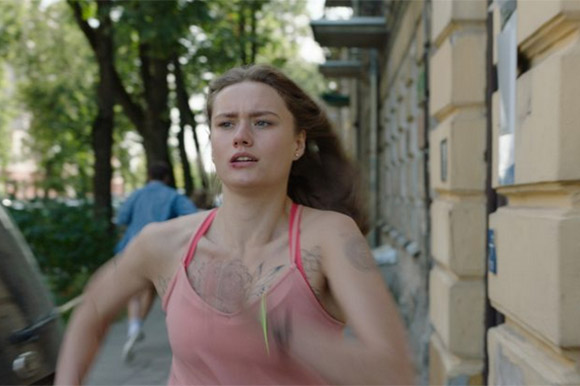 The year 2020 was very good for Lithuanian films in festivals.
The year 2020 was very good for Lithuanian films in festivals.
The Flood Won't Come / Tvano nebus directed by Marat Sargsyan and produced by Tremora, competed in the Film Critics’ Week at the Venice FF, while the short film Places / Miegamasis rajonas directed by Vytautas Katkus and produced by Afterschool was selected for the short film competition of the same festival.
Sharunas Bartas' In the Dusk / Sutemose was selected for the Official Selection of the 73rd Cannes Film Festival, but it was actually screened at the San Sebastian FF, which took 17 titles from the Cannes' selection. The film was produced by Lithuania‘s Studio Kinema in coproduction with France‘s Kino Elektron, Serbia‘s Biberche Productions, Latvia‘s Mistrus Media, Sirena Film from the Czech Republic and Portugal‘s Terratreme Filmes. In the Dusk was also selected for the Baltic Competition of the 24th Black Nights Film Festival (PÖFF).
The Spanish/Icelandic/Lithuanian coproduction Lobster Soup / Omarų sriuba directed by Pepe Andreu and Rafa Molé, and produced by Suica Films in coproduction with Rec Grabaketa Estudioa, Axfilms, and Studio Nominum, also had its world premiere at the San Sebastian FF.
A thematic retrospective organised within the San Sebastian FF, Eastern Promises. Portrait of Eastern Europe in 50 films, featured two Lithuanian films - Šarūnas Bartas’ Eastern Drift / Eurazijos aborigenas (2010), produced by Studio Kinema, and Kristina Buožytė‘s drama Vanishing Waves / Aurora (2013), produced by Tremora.
Motherland by Tomas Vengris won the Audience Award of the 2020 edition of ArteKino. It was produced by Lithuania's Studio Uljana Kim in coproduction with Latvia's Locomotive Productions, Germany's Heimat Hafen Films, and Greece's Faliro House.
The Camel by Laurynas Bareiša (2016), After Rave by Kamilė Milašiūtė (2014) and Youngblood by Marija Kavtaradzė (2013) were selected for the student film programme of the same festival, while the Lithuanian actress Aistė Diržiūtė was invited to the New Directors competition jury.
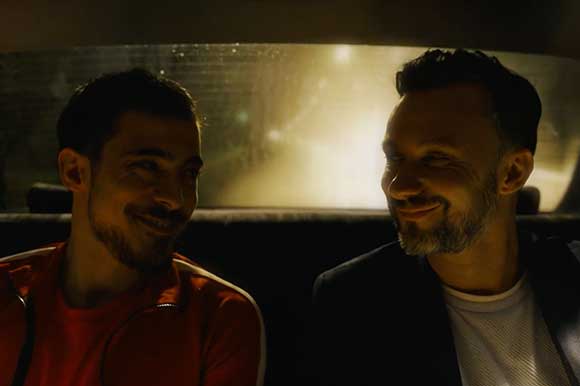 Laurynas Bareiša‘s Dummy / Atkūrimas, produced by Afterschool, became the first Lithuanian film that had its world premiere in the Berlinale Shorts programme.
Laurynas Bareiša‘s Dummy / Atkūrimas, produced by Afterschool, became the first Lithuanian film that had its world premiere in the Berlinale Shorts programme.
Giedrė Žickytė's documentary The Jump / Šuolis, produced by Moonmakers and coproduced by Latvia‘s VFS Films, premiered at the Warsaw Film Festival, where it won the Best Documentary award.
Three Lithuanian projects participated in the Eastern Promises Industry Days of the virtual edition of the Karlovy Vary IFF. The Lithuanian/Norwegian project Burial directed by Emilija Škarnulyte and produced by Just a Moment, competed for the Eurimages Lab Project Award, while I Am Fine, Thanks / Man viskas gerai by Ernestas Jankauskas and Runner / Bėgikė by Andrius Blaževičius participated in the First Cut+ programme.
Roman’s Childhood / Romano vaikystė directed and produced by Linas Mikuta had its world premiere at the 63rd DOK Leipzig, where it competed for the Golden Dove.
After winning Best Documentary at the Warsaw FF, Giedrė Žickytė's The Jump / Šuolis, produced by Moonmakers and coproduced by Latvia‘s VFS Films and France‘s Faites un voeu, became the first Lithuanian film invited to the official selection of the Roma FF. The film had its North American premiere at the DOC NYC, where it won the Audience Award. The Jump was also selected for the Baltic Film Competition at the Black Nights Film Festival.
Lithuania featured as guest at the International Film Festival for Young Audiences Filem‘On in Brussels, where Lina Lužytė’s The Castle competed for the ECFA Feature Award and the 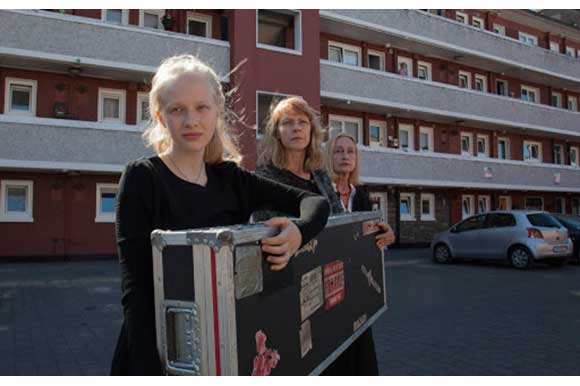 Filem’On Teen Screen Award. Another six animated short films were in the programme: Ilja Bereznickas’s The Goat Luck, Bad Luck / Ne ožkoje laimė (2017) produced by Vilaminos Film Studio, Gediminas Šiaulys’s Running Lights / Kaukai (2014) produced by PetPunk, Rasa Joni’s The Tail / Uodega (2006) produced by Rasa Joni Art, Ignas Meilūnas’s Mr Night Has a Day Off / Pono Nakties laisvadienis (2016) produced by Ignas Meilūnas, Mainardas Valkevičius’s Look / Oo. (2017) produced by MeinArt, and Darius Jaruševičius’s Stop. The Kiss (2009) produced by the Vilnius Academy of Fine Arts.
Filem’On Teen Screen Award. Another six animated short films were in the programme: Ilja Bereznickas’s The Goat Luck, Bad Luck / Ne ožkoje laimė (2017) produced by Vilaminos Film Studio, Gediminas Šiaulys’s Running Lights / Kaukai (2014) produced by PetPunk, Rasa Joni’s The Tail / Uodega (2006) produced by Rasa Joni Art, Ignas Meilūnas’s Mr Night Has a Day Off / Pono Nakties laisvadienis (2016) produced by Ignas Meilūnas, Mainardas Valkevičius’s Look / Oo. (2017) produced by MeinArt, and Darius Jaruševičius’s Stop. The Kiss (2009) produced by the Vilnius Academy of Fine Arts.
The restored Lithuanian classic The Girl and the Echo / Paskutinė atostogų diena by Arūnas Žebriūnas (1964, produced by the Lithuanian Film Studio) ran across French cinemas in 2020. The story of a girl and dreamy summer holidays screened in 16 cinemas in Paris, Lyon, Bordeaux, Marseille, Grenoble, Toulouse and other cities. The Lithuanian Film Centre has extended the cooperation with French ED Distribution for the distribution of the film in all the French-speaking territories in Europe. In 2018, the company successfully presented another Žebriūnas’ film, The Beauty / Gražuolė (1969, produced by the Lithuanian Film Studio), which was released on DVD with French subtitles.
Five Lithuanian cinema classics were presented on the newly launched platform Heritage Online by the Locarno FF in 2020: March! March! Tra-ta-ta / Marš ! Marš! Tra-ta-ta! (1964) directed by Raimondas Vabalas and produced by the Lithuanian Film Studio, The Girl and The Echo / Paskutinė atostogų diena (1964) and The Beauty / Gražuolė (1969), both directed by Arūnas Žebriūnas and produced by the Lithuanian Film Studio; Woman and Her Four Men / Moteris ir keturi jos vyrai (1983) directed by Algimantas Puipa and produced by the Lithuanian Film Studio, and I No Longer Remember Your Face / Neprisimenu tavo veido (1988) directed by Raimundas Banionis and produced by the Lithuanian Film Studio.
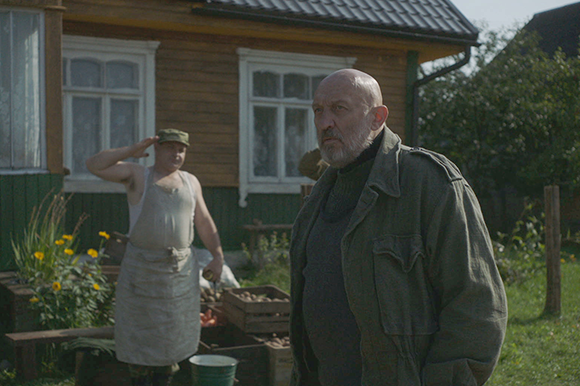 VOD PLATFORMS AND ONLINE DISTRIBUTION
VOD PLATFORMS AND ONLINE DISTRIBUTION
Film festivals and film industry meetings, as well as film industry awards moved to the virtual space and TV screens in 2020, while many Lithuanian film premieres were postponed for 2021.
The Vilnius IFF became one of the first film festivals to switch to a digital format. The decision gave a boost to local VOD platforms, which streamed films 56,000 times. According to the research company Kantar, each screening was most often watched by two people, thus the number of viewers goes up to approximately 112,000. In comparison, the 2019 festival was attended by 126,000 filmgoers.
“Despite these numbers, we lost over half of our target ticket revenue, which is a significant financial blow“, said the executive director of the Vilnius IFF Algirdas Ramaška. A total of 69 percent of the programme, representing 118 films, made it onto streaming sites and on-demand TV.
Together with TV3, the Vilnius IFF launched the Aerocinema experiment, at the first drive-in cinema held at the Vilnius Airport, in the spring of 2020. The screenings, which used the largest outdoor LED screen in the Baltics, soon became a sensation in Lithuania and around the world, with over 400 stories in the media. Aerocinema later traveled to 20 Lithuanian cities, and 118 drive-in screenings were attended by approximately 13,839 cars in over three months.
The European Film Forum Scanorama opened in cinemas in Vilnius on 4 November 2020 and moved online to the Scanorama cinema platform three days later.
The number of Netflix users grew in Lithuania in the first half of 2020. According to a research conducted by the Lithuanian Radio and Television Commission (LRTK), Netflix ended the first half of 2020 with approximately 40,000 users in Lithuania, which was double than 12 months earlier. There were 7,000 Netflix subscribers in 2018.
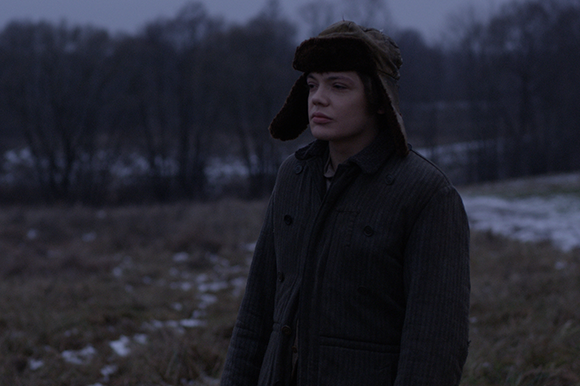 EXHIBITION AND BOX OFFICE
EXHIBITION AND BOX OFFICE
There are 80 screens in Lithuania, which is still too small a number, according to the Film Centre, in order to provide access to films in smaller cities and given the total number of productions released.
The pan-Scandinavian Forum Cinemas, owner of the largest chain of film theatres in the country (76% of the market share), has six multiplexes with 40 screens, all fully digitalised since 2012. In 2016, Forum Cinemas joined the NCG group, which became a part of the global AMC/Odeon organisation belonging to the Wanda Group since 2017.
The Polish-owned multiplex Multikino, which opened in Vilnius in 2010, has seven screens with 1,673 seats. Baltic Multiplex Ventures, which is the owner of the Cinamon multiplex in Kaunas, invested 1.6 m EUR in its five screening rooms with over 1,000 seats.
Kino Pasaka, which was founded in 2009 as an art house film theatre in Vilnius, is still the only private art house cinema in Lithuania. In September 2020, the Pasaka cinema was opened in the new Paupis district of Vilnius.
Cinemas in Lithuania were closed from 16 March to 5 June 2020 due do the Coronavirus pandemic. They closed again starting 7 November 2020 until 31 January 2021. A few attempts to organise alternative film screenings did not replace the usual activities or the economic model of the sector.
Furthermore, local cinema operators are also dependent on the global market changes during the economic crisis. The film premieres called off in the USA and Europe greatly influenced the planning of cinemas’ activities.
Based on the data provided by cinema operators, the market experienced losses greater than 14 m EUR during the year 2020. Part of the losses was compensated by Lithuanian and European Union institutions, but the grants couldn’t offset all the losses.
Cinema attendance decreased between two and six times in different cinemas in Lithuania.
According to official statistics, total admissions in 2020 were 1.5 m and the total gross 8,473,000 m EUR, compared to 4.1 m total admissions and 22,495,000 EUR total gross in 2019.
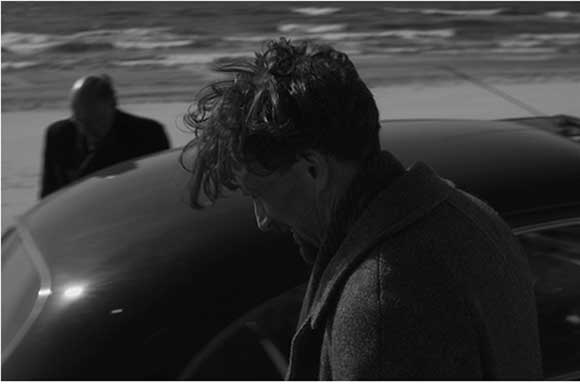 The average ticket price in 2020 was 5.45 EUR.
The average ticket price in 2020 was 5.45 EUR.
The most profitable Lithuanian film at the box office in 2020 was the romantic comedy The Perfect Date / Tobulas pasimatymas directed by Robertas Razma, produced and distributed by Nord Play. The film was released on 3 January 2020 and had more than 146,815 admissions and 874,111 EUR gross.
Imported Groom / Importinis jaunikis directed by Simonas Aškelavičius, produced and released by Acme Film, had 115,283 admissions and 698,797 EUR gross since its premiere on 31 January 2020.
GRANTS AND NEW LEGISLATION
The Lithuanian audiovisual industry relies on funds from the Lithuanian Film Centre, private funds, coproducing with foreign companies, and pan-European film support initiatives such as the MEDIA Programme and Eurimages.
In 2020 the Lithuanian Film Centre appointed a new director, Laimonas Ubavičius. He was selected from the two candidates who received the highest scores in a competition organised by the Civil Service Department under the Ministry of the Interior of the Republic of Lithuania. Starting November 2020 Laimonas Ubavičius replaced Rolandas Kvietkauskas, who had managed the Lithuanian Film Centre since its launch in 2012.
The Lithuanian Film Centre was set up after an extensive lobbying by the Independent Producers Association of Lithuania and the Lithuanian Filmmakers Union. It has had a huge impact on the local industry, which previously lacked a central body to represent it.
The Lithuanian Film Centre primarily finances film development, production, promotion and distribution in Lithuania.
In 2020 the Lithuanian Film Centre became a patron of the European Women’s Audiovisual Network (EWA). With this new partnership, the LFC supports both the presence of its local members in the network and the initiatives organised by the EWA in Lithuania.
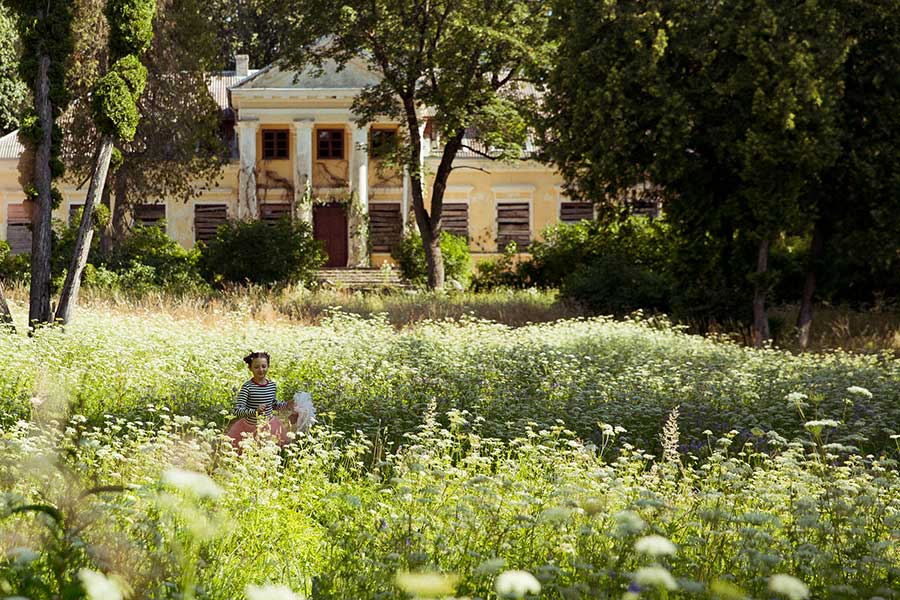 In 2018 the Lithuanian parliament approved a boost to the country’s film production tax incentive, increasing it from 20% to 30%. The new level took effect from 1 January 2019 and the legislation was renewed for a next five-year period.
In 2018 the Lithuanian parliament approved a boost to the country’s film production tax incentive, increasing it from 20% to 30%. The new level took effect from 1 January 2019 and the legislation was renewed for a next five-year period.
The updated tax incentive is available for fiction films, TV films, documentaries and animated films. At least 80% of eligible film production costs must be incurred in Lithuania and the total amount of eligible spend in Lithuania has to be no less than 43,000 EUR. The incentives scheme is administered by the Lithuanian Film Centre.
In 2020 the Lithuanian Film Centre issued 154 Investment Certificates, representing a total amount of 11,288,347 EUR financial aid for filmmaking in Lithuania. A total of 58 films used the scheme: 12 foreign films, nine coproductions and 37 domestic films.
In 2019 the Lithuanian Film Centre issued 98 Investment Certificates, representing a total amount of 6,834,286 EUR financial aid for filmmaking in Lithuania, and 36 films used the scheme: eight foreign films, eight coproductions and 20 domestic films.
The total production expenses in Lithuania were 37,911,134 EUR in 2020, compared to 22,909,399 EUR in 2019, making 2020 the most profitable year for the tax incentive scheme since its launch in 2014.
In 2020, foreign productions got incentives totalling 8,059,073 EUR.
The Vilnius Film Office was established at the end of 2011. A public non-profit entity, the Kaunas Film Office was established in 2012 as a result of a joint effort between the Kaunas municipality and the Kaunas Cinema Studio. The Vilnius Film Office and the Kaunas Film Office are members of the European Film Commissions Network.
The seaport Klaipėda, located on the Baltic Sea coast in Western Lithuania, as well its region, offer a wide range of filming locations. More at: www.klaipeda-locations.com.
TV
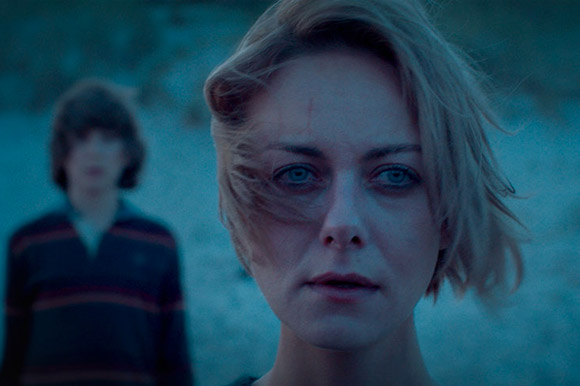 Lithuania’s public broadcaster, the Lithuanian National Radio and Television (LRT), operates three national television channels, three radio channels and an internet portal. It also provides satellite and live internet broadcasts, radio and television podcasts.
Lithuania’s public broadcaster, the Lithuanian National Radio and Television (LRT), operates three national television channels, three radio channels and an internet portal. It also provides satellite and live internet broadcasts, radio and television podcasts.
The Act amending the Law on the Lithuanian National Radio and Television came into force on 1 January 2015. This act bans commercial advertising on all LRT radio and TV channels, but provides more sustainable funding from the state budget. The assigned funding is based on the state budget revenues from the income tax and the excise revenues received in two previous years. Its operations are overseen by the LRT Council. LRT joined the European Broadcasting Union (EBU) in 1993. LRT provides assistance to foreign broadcasting companies covering events in Lithuania.
TV3 is a television channel owned by Modern Times Group (MTG, Sweden) and targeted at Lithuanian-speaking audience. It was launched in April 1993 as Tele-3, before becoming TV3 in June 1997. Now TV3 is the biggest commercial TV channel in Lithuania and brings entertainment for the whole family, offering locally produced shows, well-known international formats and the most popular sport events.
The TV6 channel was launched in 2002. It focuses on entertainment and high-profile sports events – the UEFA Champions league, comedy, horror, action films and exclusive content shows. TV6 is a Lithuanian terrestrial, satellite and cable television channel owned by the Nordic television company Viasat.
The TV8 channel, launched in 2011, is dedicated to women who want to enjoy their leisure time. It broadcasts cooking and lifestyle shows, fashion and female talk shows, romance films and series, as well as positive animation for children.
LNK TV, also known as Laisvas ir Nepriklausomas Kanalas (Free and Independent Channel), is one of the major commercial TV channels in Lithuania. It was founded in 1995 as part of MG 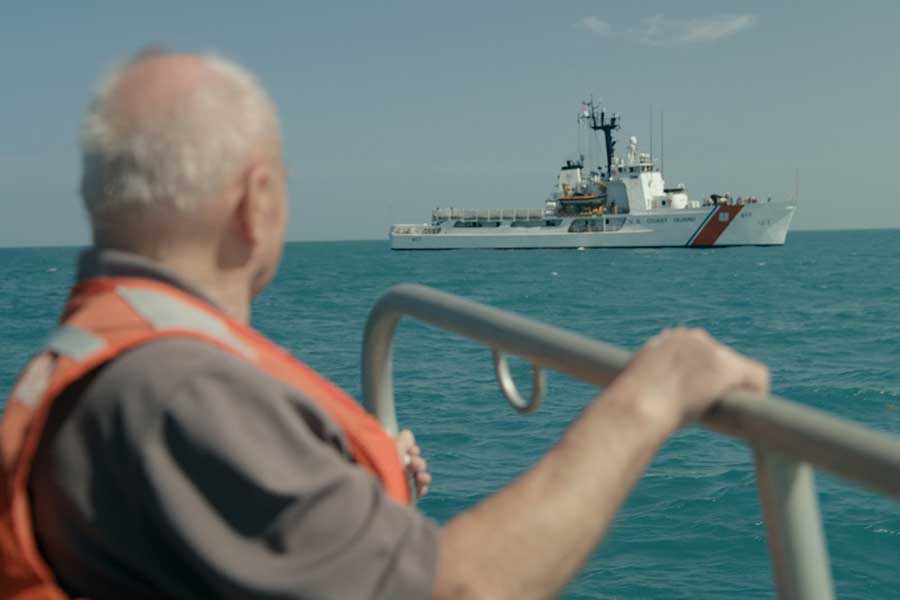 Baltic Media. It has four sister channels: TV1, Info TV, Liuks! and BTV.
Baltic Media. It has four sister channels: TV1, Info TV, Liuks! and BTV.
Lietuvos rytas TV is a Lithuanian entertainment channel founded in 2008 and airing approximately 55% international programmes.
In 2020 TV3 aired the 13th season of the most popular Lithuanian TV series Women Lie Better / Moterys meluoja geriau directed by Mykolas Vildžiūnas and Andrius Žiurauskas, and produced by Videometra. Women Lie Better is the most popular Lithuanian drama of all time and it is based on a novel by Daiva Vaitkevičiūtė. The series follows four young women and their love interests.
Also in 2020 LNK TV aired the third season of the criminal drama series Serious Deal / Rimti reikalai directed by Džiugas Siaurusaitis and produced by Urbs TV.
CONTACTS:
LITHUANIAN FILM CENTRE
Zigmanto Sierakausko g. 15, LT-03105 Vilnius
Phone: +370 5 213 0547
Director: Laimonas Ubavičius
This email address is being protected from spambots. You need JavaScript enabled to view it.
VILNIUS FILM OFFICE
Director: Jūratė Pazikaitė
Konstitucijos pr. 3-313
Vilnius, LT-09601
Phone: 85 211 2620
Mobile:. 8 614 04 696
This email address is being protected from spambots. You need JavaScript enabled to view it.
This email address is being protected from spambots. You need JavaScript enabled to view it.
www.filmvilnius.com
KAUNAS FILM OFFICE
Darius Baltušis
Laisves av. 54, Kaunas, 44246
Phone: +37069837732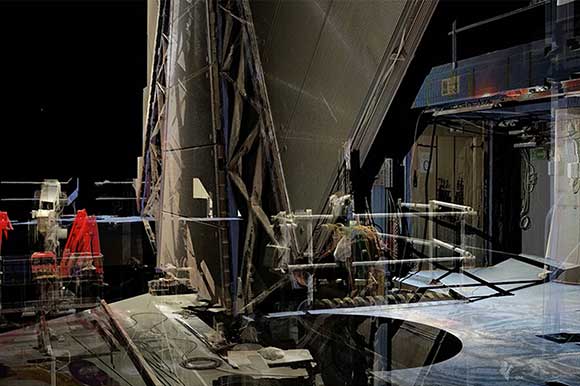
This email address is being protected from spambots. You need JavaScript enabled to view it.
www.kaunasfilmoffice.eu
KLAIPĖDA LOCATIONS
Anelija Juškevičiūtė
Phone: +370 687 16001
This email address is being protected from spambots. You need JavaScript enabled to view it.
Report by Auksė Kancerevičiūtė (2021)
Source: Lithuanian Film Centre



















